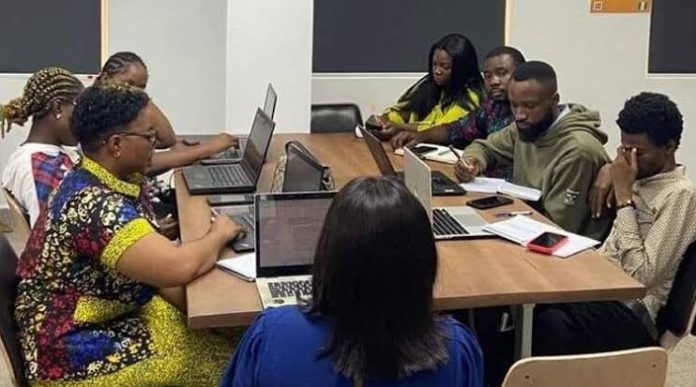The Federal Government of Nigeria, in partnership with the World Bank and private sector collaborators—Start Innovation Hub, Georgia Consulting, and Crestage Consortium—has launched a groundbreaking digital skills training initiative in Akwa Ibom State. The project, which aims to boost economic opportunities and bridge the digital divide, kicked off with an orientation session in Uyo for more than 2,000 applicants.
The training initiative, part of the Innovation, Development, and Effectiveness in the Acquisition of Skills (IDEAS) project led by the Federal Ministry of Education, will focus on equipping 700 participants with essential skills in Digital Marketing, Data Analytics, and Cybersecurity. The program stands out for its commitment to inclusivity, as special arrangements have been made to ensure the participation of Persons With Disabilities (PWDs).
An Inclusive Approach to Digital Empowerment
Inclusivity is a central pillar of the initiative, with over 10% of the participants drawn from the disability community. This deliberate effort to integrate PWDs into the digital economy aligns with the government’s broader agenda to foster equality and empower marginalized groups through education and skills acquisition.
Mr. Hanson Johnson, CEO of Start Innovation Hub, emphasized that the program is not just about acquiring skills but about providing real opportunities. “This training goes beyond theoretical knowledge. It ensures that participants are job-ready by linking them with employment opportunities upon completion,” he said. Johnson also praised the government and partners for ensuring that PWDs are fully included, both in the training sessions and future job placements.
Structure and Impact of the Program
The training is structured to provide participants with three months of intensive, hands-on learning, followed by a three-month internship, offering them real-world experience. This dual approach—technical training combined with business development skills—is designed to create well-rounded professionals capable of excelling in Nigeria’s growing digital economy.
“The goal is not just to teach participants how to use tools and platforms but to make them competitive in the job market,” said Johnson. “From digital marketing campaigns to analyzing data trends, to securing systems against cyber threats, participants will gain the skills that modern businesses demand.”
Participants Optimistic About Future Opportunities
The orientation session set the tone for the months ahead, with participants expressing excitement and optimism about the program’s potential to open new career paths. Many attendees, including those from the disability community, voiced their appreciation for the inclusive approach.
“It’s inspiring to see PWDs being given a fair chance,” one participant remarked. “This is the kind of program that can change lives, and I am grateful to be a part of it.” Another PWD participant added, “Access to training like this is rare for people like us, so this is a great opportunity to build a sustainable future.”
The project’s coordinator, Mr. Ndifreke Patrick, encouraged participants to be fully committed throughout the training. “The opportunities provided by this program are limitless, but your success will depend on your level of engagement,” he advised. Instructors also gave participants an overview of the core areas of focus—digital marketing, data analytics, and cybersecurity—highlighting the relevance of these skills in today’s economy.
Creating Job Pathways Through Internships and Partnerships
One of the program’s most innovative aspects is its internship component, which connects participants with companies actively seeking digital talent. The internships will not only provide hands-on experience but also help participants develop professional networks, increasing their chances of securing permanent employment after the program.
The partnership with the World Bank and private-sector collaborators ensures that the initiative will have both financial and technical backing. This level of support is critical to ensuring the program’s long-term sustainability and impact.
The training also aligns with Nigeria’s national skills development strategy, which emphasizes the importance of equipping young people and marginalized groups with market-relevant skills. With the country’s digital economy rapidly expanding, there is a growing demand for professionals skilled in digital marketing, data management, and cybersecurity.
A Vision for a Digital and Inclusive Nigeria
The IDEAS project exemplifies the government’s focus on fostering economic growth through human capital development. By empowering participants with in-demand digital skills, the program aims to address unemployment while reducing inequality. For PWDs, the initiative offers a rare opportunity to overcome barriers to education and employment, ensuring that they are not left behind in Nigeria’s digital transformation.
“PWDs make significant contributions to society, but their talents are often overlooked,” said Johnson. “With programs like this, we can unlock their potential and give them the tools to thrive.”
The government and its partners hope that the success of the Akwa Ibom training will serve as a model for future skills development programs across the country. There are plans to replicate the initiative in other states, further expanding access to digital education and inclusion.
As participants begin their training journey, the atmosphere is charged with excitement and hope. The program promises not only to equip individuals with the skills needed for the digital economy but also to build a future where everyone—regardless of ability—can participate and prosper.
This initiative stands as a bold step toward bridging the skills gap in Nigeria and ensuring that all citizens, including PWDs, are part of the country’s digital revolution.


